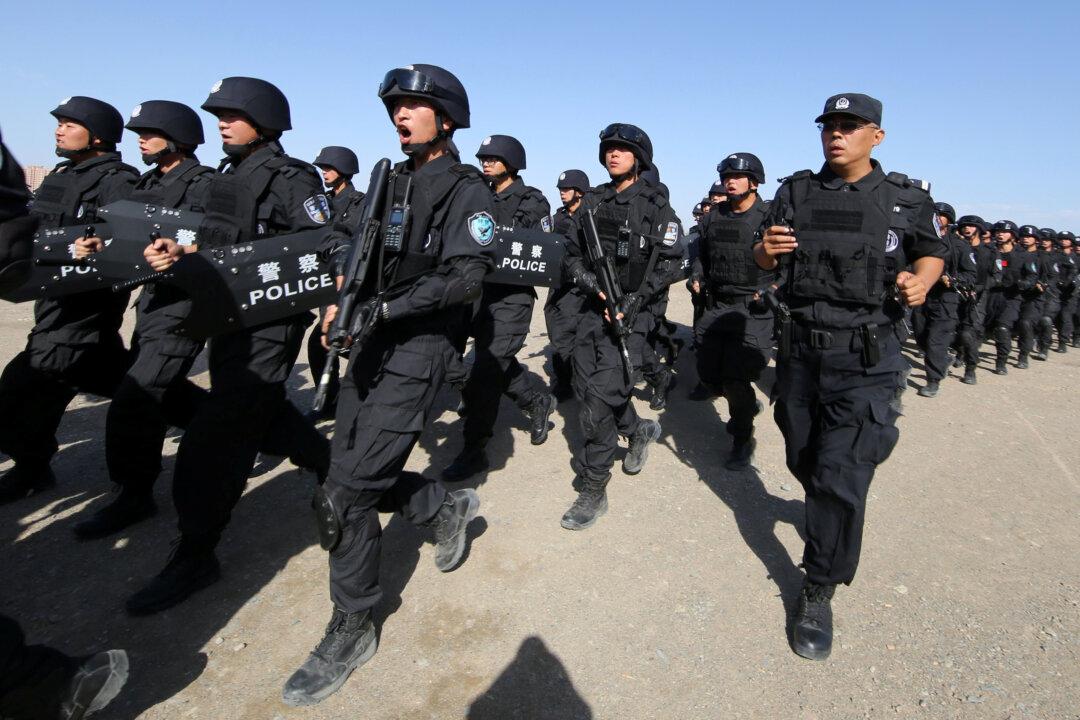BEIJING—Spending on security-related construction tripled in 2017 in China’s far western region of Xinjiang, where Beijing is accused of detaining as many as one million ethnic Uyghurs and other Muslims, an academic analysis of government expenditure found.
Beijing says its “vocational training centers” in Xinjiang camps teach employment skills and legal knowledge aimed at curbing religious extremism.
The report published on Nov. 5 by U.S. think-tank the Jamestown Foundation examined government budget data and found spending on security-related construction in Xinjiang rose last year by nearly 20 billion yuan ($2.90 billion), or 213 percent.
“Xinjiang’s budget figures do not reflect increased spending on vocational education...as the region ramped up camp construction; nor do they reflect an increase in criminal cases handled by courts and prosecutors,” said the report’s author, Adrian Zenz, an anthropologist at the European School of Culture and Theology in Germany.
“Rather, they reflect patterns of spending consistent with the construction and operation of highly secure political re-education camps designed to imprison hundreds of thousands of Uyghurs with minimal due process.”
It also found that despite the purported large “vocational training” campaign, employment outcomes had not markedly improved, according to Xinjiang’s own official employment figures.
Whatever training the facilities do provide, Zenz said, it appeared it was not administered or paid for by the vocational education system.
The Xinjiang government and the State Council Information Office, which doubles as the Communist Party’s spokesman’s office, did not immediately respond to requests for comment.
On Tuesday, foreign ministry spokeswoman Hua Chunying said she did not personally know how much Xinjiang’s security expenditure was.
Reports of mass detentions and strict surveillance of ethnic Uyghurs and other Muslims have prompted the United States to consider sanctions against officials, such as Xinjiang Communist Party chief Chen Quanguo, and companies linked to accusations of human rights abuses.
A bipartisan group of U.S. lawmakers proposed legislation on Oct. 10 that would urge U.S. President Donald Trump to condemn “gross violations” of human rights in Xinjiang and to press his Chinese counterpart, Xi Jinping, to close the “political re-education camps” immediately.
Other sanctions raised for consideration by the proposed act include a ban on sales or provision of U.S.-made goods or services to Xinjiang state agents and the barring of certain Chinese entities—including the Xinjiang police bureau—from purchasing U.S.-made equipment that could be used for surveillance.
Over the years, Xinjiang has been transformed into a vast security state, packed with police stations, street cameras, and security checkpoints at which electronic identity cards are scanned.
After initial blanket denials, Chinese officials said in recent weeks they were not enforcing arbitrary detention and political re-education across a network of secret camps, but rather that some citizens guilty of “minor offenses” were sent to vocational centers to provide employment opportunities.
While prison expenditure doubled between 2016 and 2017, spending on prosecution on criminal suspects was largely flat, Zenz said, indicating it was likely that few of the so-called criminals involved only in minor offenses were put on formal trial.
China’s record will be examined by the U.N. Human Rights Council on Tuesday, the first time since 2013, in a regular review expected to focus on its treatment of ethnic minorities, especially Uyghurs and Tibetans.





